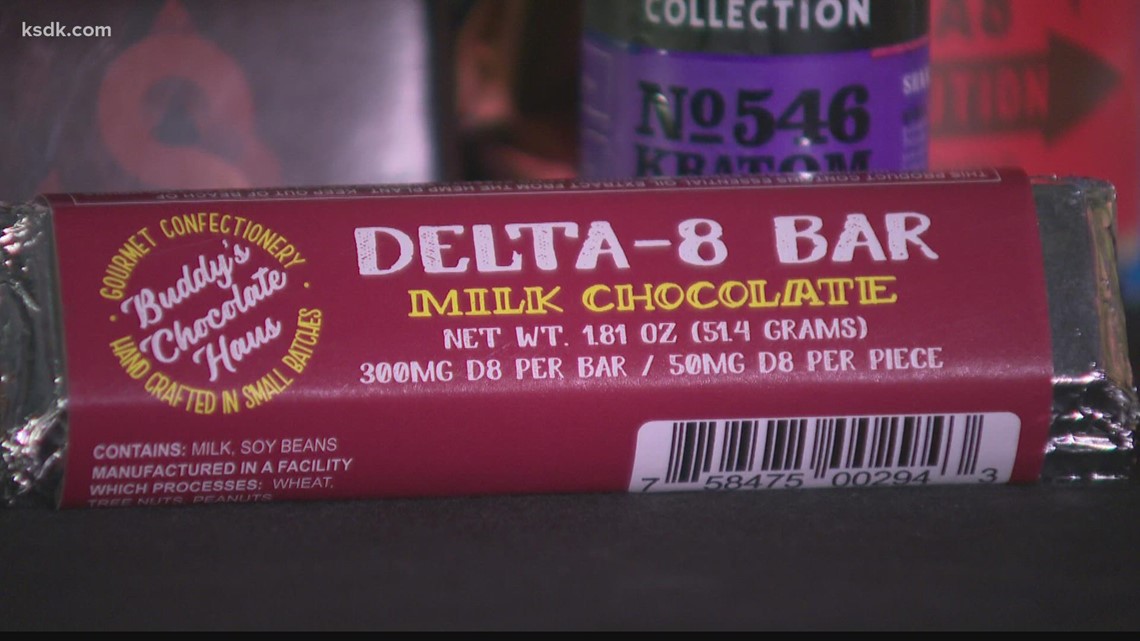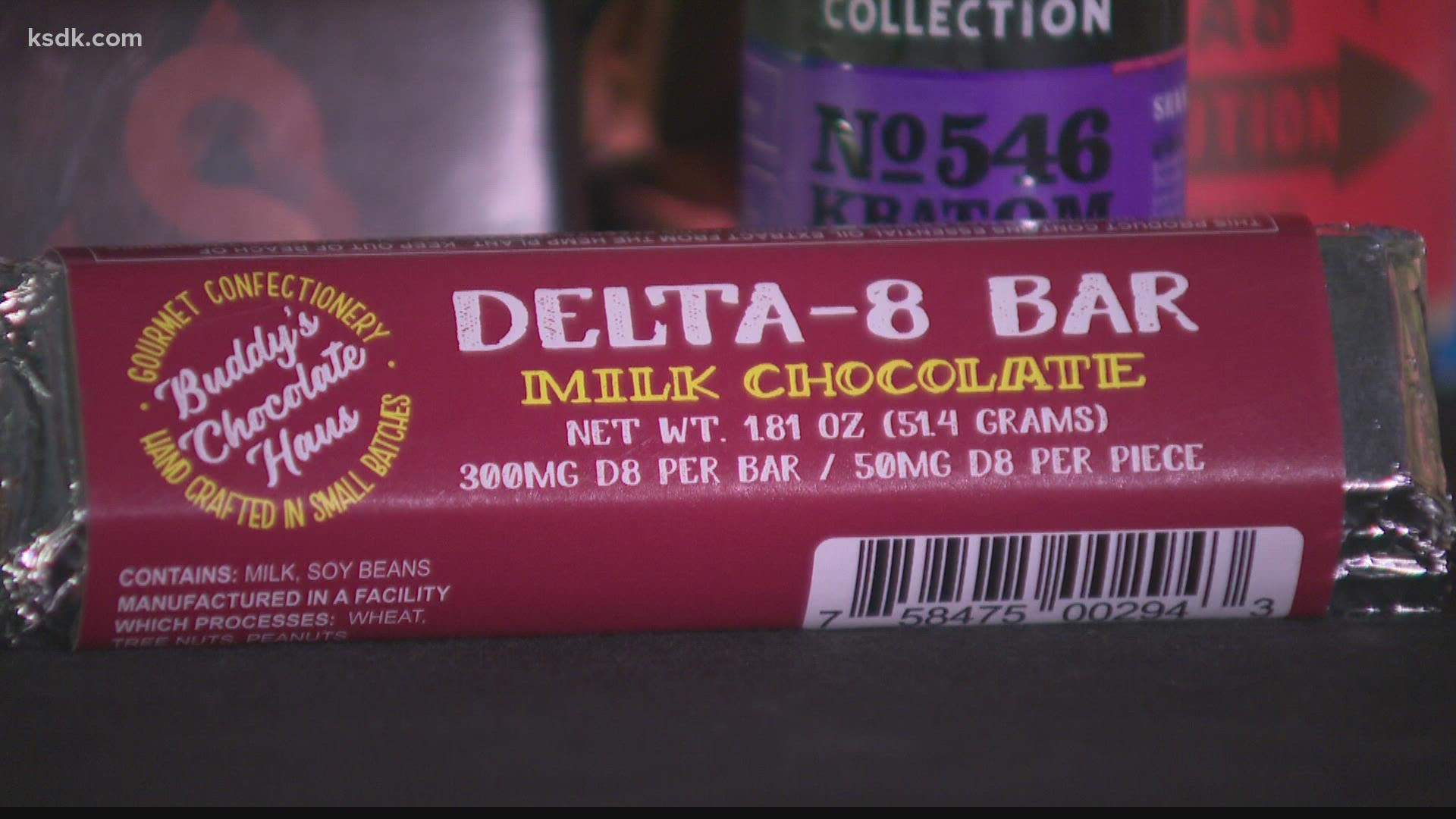ST. LOUIS — Federal health officials are now warning healthcare professionals about a rise in adverse events in kids from medicinal and recreational products made for adults.
Hundreds of reports into the National Poison Data system are related to delta-8 products and CBD, leaving the Centers for Disease Control and Prevention and the Food and Drug Administration to urge consumers to keep those products out of the reach of kids.
Some critics are going to their lawmakers asking for these products to follow stricter guidelines.
Delta-8 is gaining popularity in states that do not have recreational marijuana. It's cheaper for the consumer, and it is completely legal. Delta-8 is a cannabinoid that is usually extracted from hemp, rather than marijuana. Then it's mixed with chemicals to become a compound that can get you high.
It is legal under the 2018 federal Farm Bill, basically, as long as the THC comes from hemp and not marijuana, it can be purchased anywhere. There are no federal regulations setting a minimum age, though some stores ask that the purchaser is at least 18 years old. You can buy it online, and there are no guidelines about labeling and packaging.
You can buy delta-8 products that look like children's snacks. You often don't get nutritional information or an ingredient list, either.


Healthcare experts and poison control centers are raising concerns. In the first seven months of 2021, the National Poison Data System received 660 reports of adverse reactions in people exposed to delta-8. About 41% of the calls were unintentional exposure, and 77% of the unintentional exposures were kids younger than 18.
Some of those children were admitted to intensive care units.
"So when they end up in the ICU, it has been because they had to be intubated to help them breathe and put on a ventilator," said Julie Weber, the director of the Missouri Poison Control Center. "It can be very serious."
Weber is also the president of the American Association of Poison Control Centers and oversees 55 poison centers across the US. She's seen a significant increase in cases regarding cannabis and delta-8.
"What I have seen with the product and similar is a huge increase," said Weber. "[It] more than doubled just year-over-year for children who are getting into these products because they are in edible products."
Weber said she only saw 19 known delta-8 cases in the Missouri Poison Center last year but that's also likely because they hadn't collected data specifically on delta-8 until fairly recently. Over a three-year period, the center saw 160 reported exposures to some sort of edibles, and it started in 2019 with about 20 cases.
Schools are struggling with these incidents as well.
In early January, two students at Jennings High School had to be transported to an area hospital after they ate some sort of gummies at school. They had overdosed and had to be taken to the emergency room.
"THC and gummy bears are the biggest ones that's out right now," said Leon Hite III, the Director of Safety and Security for the Jennings School District. "So, you're talking about candy now. What kid is going to eat one piece of candy? But now we're OD'ing now, and that's a big issue."
Critics say a big issue with delta-8 is that it's not required to follow the same rules as cannabis. That's why delta-8 products can look like children's cereal or gummy bears. The packaging can be flimsy, and people can even sell open items, cookies, in stores.
When 5 On Your Side asked a merchant how old you have to be to buy delta-8, two workers responded with, "We try to get people to be 21." If you go online to purchase delta-8, some companies ask if the user is at least 18 to enter their sites.
It can be a sore subject for those in the cannabis industry, who have to follow stringent state laws concerning marijuana products.
"You have many businesses now who are infusing products and then selling those," said Pamela Althoff, the executive director of the Cannabis Business Association of Illinois.
Recreational marijuana is legal in Illinois, while only medical marijuana is legal in Missouri.
"Even more so, you have no idea exactly what you're consuming," continued Althoff. "That would be illegal to do with cannabis, but it's not illegal to use one of those hemp intoxicating products."
Althoff and Weber both agree, regulating a psychoactive like delta-8 could help keep people safer, especially children.
"Nobody is 100 percent sure of what's in it," said Weber. "What we often see when we have cases, is that there are adulterants in these products."
There is a bill in Illinois that could find a regulatory framework for hemp intoxicating products, which basically means delta-8 would have to follow the same guidelines already in place for cannabis.
Delta-8 is not FDA-approved and is currently banned or being questioned in at least 19 states, according to CBD Oracle, a cannabis publication. Missouri has no restrictions.
As more states consider delta-8 regulations, lab tests done by FESA labs — a lab that specifically tests cannabis and THC products — showed that some delta-8 products on the shelves were 7,700 percent over the legal limit of THC. It does not surprise many health officials since many delta-8 products do not have any ingredient or serving size information on their edibles or drinks.
It's not about banning or restricting products that are legal. It's about making clear what people are ingesting, especially if they end up needing an intervention, like poison control.
"There's no guarantee of what you're buying," said Weber. "And that's what gets us concerned is not knowing what's really been ingested."

